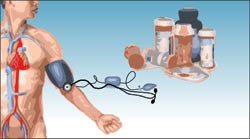
Just 2 minutes to check on silent killerHave you had your blood pressure checked lately? You can have the silent killer for years without knowing it. The good news is that if diagnosed early, it can be treated and controlled with a number of different mechanisms. "Hypertension is a risk factor for various disorders such as stroke, ischaemic heart disease and peripheral vascular disorders," says Consultant Physician Dr. Anil Goonetilleke. Unfortunately, most people with the condition are unaware of it until they have a heart attack or stroke. What is hypertension? Blood pressure is the force of blood pushing against the walls of arteries. Needless to say, the heart pumps blood with every heartbeat. The pressure is the highest when the heart beats (systolic) and lowest when the heart rests (diastolic) in between the beats. These measurements are written one above the other. While 120/80 is considered normal, a reading of more than 140/90 is considered high. High blood pressure can be classified as either essential (primary) or secondary. Essential hypertension indicates that no specific medical cause can be found to explain the patient's condition. Secondary hypertension on the other hand refers to high blood pressure as a result of another condition relating to renal, endocrine, cardiac, drug problems, etc. Most often a profusion of factors can influence the arterial pressure.
Who is likely to get hypertension? Dr. Goonetilleke says that the condition is commoner in men and women above 40 and has something to do with stress although not directly. Your chances of having high blood pressure are also high if you are overweight and have a family history of high blood pressure. Other factors that can contribute to it are alcohol, smoking and a sedentary lifestyle. Significantly, once high blood pressure develops, it usually lasts a lifetime. Diagnosis: While 99% of people with hypertension feel no symptoms a few sufferers may get headaches. Hence, the only way to find out if you have high blood pressure is to have your blood pressure measured. Doctors and nurses use a mercury sphygmomanometer to measure BP. Depending on how high the reading is, several other readings may have to be done. Occasionally anxiety whilst with the doctor may cause a patient's BP to shoot up. If your BP is borderline, a clinician may observe the readings over a few months before commencing treatment. If the measurement is high, treatment begins the same day. Treatment: "Every patient with high BP is advised lifestyle modifications in an effort to reduce factors that aggravate BP," the doctor says. This includes regular exercise, refraining from alcohol and controlling of co-morbid factors such as Diabetes, smoking and cholesterol. Along with lifestyle modification, drugs are recommended for high BP. "As the condition cannot be cured, treatment is for life," Dr. Goonetilleke emphasises. Hence visits need to be made to the GP or physician on a regular basis to monitor if readings are stable. As far as medication is concerned, patients usually are started with a Betablocker or a Thiazide Diuretic and monitored. A second drug is then added if the first drug proves to be insufficient. 75% of patients need two drugs. Depending on the type of drug, the dosage is recommended either in the morning or evening to keep the blood pressure regulated throughout the day. People with special needs like those with Diabetes are given other drugs as drugs of first choice. For example, a person with diabetes would be started on an ACE Inhibitor to control high BP as it would protect his kidney besides lowering his BP; a person with Angina would be advised a beta blocker or a calcium blocker as the first choice; a patient with prostate problems would be started with an alpha blocker. Drug combinations are required in most patients for optimum control, Certain drugs such as the ACE Inhibiter and Alpha-blockers can make the BP suddenly drop causing patients to faint. Hence such drugs are started at night when a patient is recumbent. Elderly patients or those with heart failure are given such drugs in hospital where they can be closely monitored. Compliance is of utmost importance. Patients should take the medication at the prescribed time each day. Further a diet with less salt and low fat is recommended. Hypertension is a serious problem that can damage blood vessels and eventually lead to strokes, heart attacks, heart failure, vision problems and kidney damage. Hence it is imperative to get one's blood pressure measured once in three months or during an annual medical. "It takes only two minutes," Dr. Goonetilleke says. A periodic check can forewarn you to keep under control this global epidemic. |
|| Front
Page | News | Editorial | Columns | Sports | Plus | Financial
Times | International | Mirror | TV
Times | Funday
Times | Medi Scene || |
| |
Copyright
2007 Wijeya
Newspapers Ltd.Colombo. Sri Lanka. |
